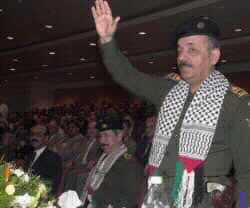Iraq prepared for talks to organise the return of UN arms inspectors, under the shadow of US threats to enforce disarmament despite opposition from China, France and Russia and the clamour of anti-war protests.With Washington intent on giving Baghdad just seven days to agree to US demands, Hans Blix, chairman of the United Nations Monitoring, Verification and Inspection Commission (UNMOVIC), was to get down to the logistics of the resumption of arms checks after a gap of four years.
Blix, accompanied to Vienna by eight aides, including senior advisers on training, planning and legal matters, would focus exclusively on practical details, his office said.
Blix last met Iraqi officials on September 17, the day after President Saddam Hussein agreed to allow weapons inspectors back without conditions.
The UNMOVIC chief said he hoped to have an advance party in Iraq on October 15, and intends to report back to the world body around October 3 on the upshot of the Vienna talks.
In Washington, the White House insisted Saturday that Baghdad must comply with any new UN resolution aimed at stripping Iraq of weapons of mass destruction.
"Compliance with the UN resolution is not a matter for negotiation," White House spokesman Jimmy Orr told AFP.
However Iraqi Vice President Taha Yassin Ramadan ruled out Iraqi cooperation. "The position on the inspectors has been decided, and any new measure intended to harm Iraq is unacceptable," he said.
A US draft resolution under negotiation would give Iraq just seven days to declare all its weapons of mass destruction programs and 23 additional days to open up totally to UN inspections or face military strikes.
Under threat of possible unilateral US military action, Iraq agreed on September 16 to allow UN weapons inspectors to return "without conditions" following a break of nearly four years.
And it has gone on to explain that inspectors will have unfettered access to go anywhere.
Meanwhile, protesters in London and Rome took to the streets on the weekend to voice opposition to a war.
Anti-war sentiment sparked protest in cities across the globe, including a huge rally in London with members of parliament and public figures that organisers said drew 400,000 into the streets. Police were more conservative, pegging the number at 150,000.
In Rome, some 100,000 demonstrators protested Washington's Iraq policy, according to organisers, challenging Prime Minister Silvio Berlusconi's support for US threats against Saddam.
The Trotskyite Workers' Party in Paris called Saturday for the broadest possible mobilisation of demonstrators to "say No to war in Iraq."
And London's "Don't Attack Iraq" demonstration -- which had "freedom for Palestine" as a parallel theme -- was spearheaded by a broad coalition including veteran pacifist groups and Muslim representatives.
Protests were also held in Sydney and Denver, Colorado, outside a Republican fundraiser attended by Bush.
Meanwhile, Iraqi Foreign Minister Naji Sabri labeled the United States and Israel the "real axis of evil" Saturday.
"The real axis of evil is the axis of Washington-Tel Aviv. This is the real axis of evil," Sabri told reporters in Tehran, where he aims to raise opposition to a US strike from his country's old arch-foe Iran.
In Moscow, US envoy Marc Grossman, accompanied by British Foreign Office envoy Peter Ricketts met Foreign Minister Igor Ivanov, who said weapons inspectors should return as quickly as possible to Iraq.
Grossman, US under secretary of state for political affairs, gave no indication of whether his team had made progress in securing Russian approval for a Security Council resolution granting the United States the right to attack Iraq should Baghdad not fully comply.
"We attach particular importance to the quickest possible return to Iraq of UN weapons inspectors who must give their answer regarding the presence or otherwise of weapons of mass destruction," Invanov said in a statement.
Traditionally an Iraqi ally, Moscow has put up heavy resistance to US and British diplomatic pressure, arguing that no new UN resolution is necessary following Saddam's agreement to allow UN arms inspectors unfettered access.
France on Friday had also rebuffed Grossman's efforts to gain support for the hardline draft, with President Jacques Chirac restating his opposition to any UN resolution that allows automatic armed recourse against Iraq.
France favors a resolution that is "simple and firm, showing the unity and determination of the international community", Chirac's spokeswoman Catherine Colonna said.
PHOTO CAPTION
Iraqi Vice-President Taha Yassin Ramadan salutes members of the Arab Professional Organizations' Conference for Solidarity with Iraq in Baghdad on Saturday, Sept. 28 2002. Ramadan said Iraq would not accept any resolution from the U.N. which harms Iraq.(AP Photo/Ali Haider).
- Sep 28 11:36 PM ET
- Author:
& News Agencies - Section:
WORLD HEADLINES


 Home
Home Discover Islam
Discover Islam Quran Recitations
Quran Recitations Lectures
Lectures
 Fatwa
Fatwa Articles
Articles Fiqh
Fiqh E-Books
E-Books Boys & Girls
Boys & Girls  Hajj Rulings
Hajj Rulings Hajj Fatwas
Hajj Fatwas














